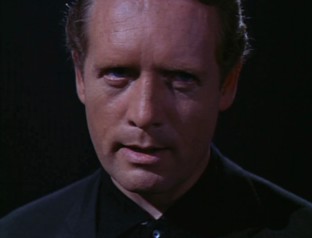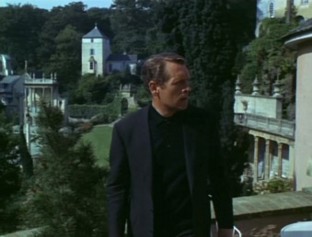| "The new electronic interdependence recreates the world in the image of a global village." |
| Marshall McLuhan, The Gutenberg Galaxy (1962) |
| |
No. 6: "The whole world as the Village?"
No 2: "That is my hope…" |
The Prisoner - 'The Chimes of Big Ben' (1967) |
| Part 1: |
"Where am I?" |
| |
"In the Village..." |
|
|
Where
do I start to write about a television series that defined
and channelled my teenage rebellion; one that alienated
a great percentage of its original audience by being too
smart for its own commercial good; a series that allowed
me to break into television direction via a documentary
about those, like myself, who made special efforts to celebrate
and spread the word of this extraordinary and singular piece
of television art? Yes, that ridiculously long sentence
was a question. The answer is in your local newsagents,
once fortnightly until mid-July. No, not 'The Classic War
Movie Collection'...

Yes,
you've seen them. Those large cardboard sheets you find
perched in odd places in the shop with DVDs attached like Inspector Frost and CSI.
What about 'Build Your Own Spitfire' (this is no joke).
But there’s that other one propped up next to the
pamphlet "How To Sell Old TV Off At Ludicrously Inflated
Prices". Yes, that one with that bloke from Danger
Man. What’s that all about? What's it called? The Prisoner… The box set of all
17 episodes will put you back about £50. Buying them
in fortnightly instalments will cost £129.83. So what’s
the extra £79 worth shelling out for? The colour map
of the Village 'free' with issue one? Now, a few months
on, it must be a 'collector’s item', surely. The accompanying
'Prisoner Files' are a lot better than expected, more serious
in their examination of the particular episodes than publicity
fluff usually is but even 17 of those are not quite worth
the £4.64 each you're invited to pay for the simple
privilege of having each episode on one single DVD…
So what the hell am I doing buying them again? I'm being
a completist (terrible habit, terrible made-up word and
possibly a synonym for 'idiot').
I'm
trying to objectively judge one thing in the world I cannot
possibly be objective about - The Prisoner,
the world’s greatest television series.
To
those of you in the 'want-to-know' camp, let me introduce
you to a series that re-drew the map of what TV was capable
of, a creative hurricane that threw down a gauntlet (in
a hurricane, no mean feat) that no TV series produced since
has dared to pick up. Is there such a thing as an artistic
TV programme or programme maker? Dennis Potter? Yes. He
pushed and pulled and screamed and shouted and he was heard
and his legacy is a powerful body of work that will stand
the test of time. Some historic events underline TV's power.
The moon-walks via closed circuit TV in 1969 and beyond?
Of course. If they hadn't been televised, they would not
have been one hundredth as effective as living history.
We could all vicariously join Astronaut Armstrong while
he misquoted in front of the biggest TV audience of all
time. Roots, Dallas and
even Life on Earth - all genre-stretching
examples of world-shaking television (in worthy and less
worthy ways). But none (not one) held a shaky candle
to a series about a man who is kidnapped and placed inside
a metaphor of the world (called simply 'the Village') and
then throughout 16 more episodes, he tries to escape and
'they' try to grind him down, find out why he suddenly resigned
his secret job. Simple. Simple?
Simple,
my ass.
At
the age of 18, the day after my final A Level exam, my father
drove me to the small North Wales town of Penrhyndeudraeth
to attend my first Prisoner convention
at the real 'Village' (or Portmeirion as its famous pottery
and 'the Village' is formally and real-worldly known). I
re-visited this special location in 1994 to direct a BBC
documentary on the continuing fan base that consistently
and entertainingly keeps the series - and more importantly
- the spirit of the series very much alive. Greatness only
dies if those touched by it die too.
We
are very much alive.
| Part 2: |
"What do you want?" |
| |
"To raise the television quality bar..." |
|
|
In
the mid to late 60s, the outgoing TV series Danger
Man segued into The Prisoner so effortlessly that it was generally assumed that the prisoner
himself was secret agent John Drake. It didn't matter. That
was so far from 'the point', it was akin to arguing whether
Cézanne's apples were Granny Smith's or Cox's. The
Prisoner was no simple action-oriented, 'lives
by his wits', ITV 60's pot-boiler (though it sometimes borrowed
the style and the action man trappings). It was, plainly
put, a bold, critical, allegorical vision of a soon to be
familiar world - a world we recognise now as our own, the
series' prescience being both uncanny and alarming. The
Prisoner tackled weighty issues - politics, education,
the nature of freedom, drug abuse, trust, state authority
- and sometimes riffed off the surreality of the socially
uproarious time in which it was made (mid to late sixties).
Certain episodes could be downright impenetrable (if you
were watching with "Danger Man-watching"
eyes). But if you primed yourself for television that 'intelligenced'
or 'smartened up' rather than 'dumbed down', then the rewards
were significant.
SIDE
NOTE: Why are movies and TV shows getting
significantly dumber? Money. What happened thirty
years ago or has the erosion been a gradual one? Money.
No, really. What DID happen? Money. Yesterday it was The Singing Detective and today it's
'reality TV'? Get me out of here...
It
is my humble opinion that The Prisoner is the greatest television series ever made. It had more
to say than any other series, said it more intelligently,
said it entertainingly and said it in a way that prompted
debate among viewers unused to a series that had the balls
to talk back at them. Patrick McGoohan in many ways (not
least by starring-role association) came to dominate the
series despite George Markstein's crucial role in having
a hand in creating and developing the show. McGoohan often
wrote and directed episodes sometimes under pseudonyms.
It's always seemed odd to me that on one of the greatest Prisoner episodes (Free For All),
he chose to have his writing credit read 'Paddy Fitz' and
yet, the less accessible (but brilliant all the same) Fall
Out was proudly announced 'Written and Directed by
Patrick McGoohan'. By then I guess McGoohan had accepted
all responsibility for the series, for good or ill.

Despite
its unusually large budget (for a TV series) and its 35mm
production values, The Prisoner is a compromised
series. The lacklustre episodes show some creative desperation
in their conception and execution. By then, the series was
being broadcast and audiences were starting to demand answers.
This was the era of cat stroking crime lords and Bond was
starting to peak as an iconic pop culture force to be reckoned
with. Answers to the conundrums of The Prisoner were (again) not really the point but those who saw the
series on one level demanded their level one reading. Who
was No. 1? No, really. Who was No. 1? People actually wanted
to know - which sort of negated the entire series in a way.
Of
course, there was no No. 1 in the show's original conception
- that would be like Orwell giving Big Brother's actual
name and address in the addendum of 1984). Imagine
if Big Brother's name was Kevin? And he lived just north
of Putney, drove a Skoda, loved Cranberry juice and... Kind
of spreads the Germolene on to the allegorical sting. How
seriously could Orwell's work be taken from then on? In
the allegorical world, there can only be one answer to that
question "Who is No. 1?" (if an answer is forced
by viewer and economic pressure) and in the final episode Fall Out McGoohan supplied a literally multi-faceted
answer much to my unending delight. To the sixties' audience,
it was a surreal slap in the face. But we will get to Fall
Out a little later.
So
what did ITV's financier Lew Grade want (apart from McGoohan
to make Danger Mans until his Zimmer frame
compromised his right hook)?
The
Prisoner has many faults, technically and artistically. The recreated
'Village' sets are risible (studios do not duplicate beaches
with anything approaching verisimilitude) and all too often
the differences between the 'really there in the Village'
and the 'studio mock up' are painfully obvious. Artistically, The Prisoner is a series whose best and
strongest ideas were spread thinly. There is a good reason
for this. There were only seven episodes conceived and planned
but Lew Grade could not sell and have syndicated seven episodes
in the all-important American market. He needed twenty six.
McGoohan and writers locked themselves away and over a weekend
came up with ten more ideas for episodes. It was generally
believed that even those ten were spreading the allegory
a little thin.
Take
a few seconds to think about that. You create a rounded
work that comprises of seven instalments. It’s working
well as seven instalments. In fact, as seven instalments,
it seems to defy economic convention and move people, affect
people and 'warn' people of society's imminent future. But
no! The gods of US syndication have to be sated. Can you
imagine Sir Lew Grade's memo to Patrick McGoohan mid-season?
“Dear
Patrick, (THPAITVATT)
|
(the-highest-paid-actor-in-television-at-that-time)
|
Much
as I love and appreciate the extraordinary effort
that you and your dedicated cast and crew have put
into regarding the production of The Prisoner,
I still feel that the original premise of the series
could best be served by taking the seven shows you
are happy with and stretching the original concept
to cover many more episodes..."
|
McGoohan
pops like an over-stressed Rover… Maybe that’s
where the final episode's title came from - Fall Out…
This
was not the best time to get this order from on high (for
that is what it was). It diluted greatness (but what did
'TV' care?). It made a mockery of McGoohan and Markstein's
vision but all things considered, Grade's thinly veiled
ultimatum forced McGoohan and co. to expand upon an original
series that may have been insanely great (Apple, allow something
else to share that description) but economically unviable.
This is not to condemn the extra ten as unworthy. A few
are genuinely superb but the lesser ones point to the compromises
made very sharply. Still, I cannot imagine a world without The Prisoner and if that meant a few forced
lacklustre episodes then that's the price to pay for seven
hours and more of television that continue to awe.
If
you still have any doubts, find a copy of Free For All (aka episode 4 or 5 or 2 or 3 depending which Prisoner expert you consult) and play it - NOW. This is an election
year. You want to understand what an election actually is
(or what it’s been perverted into?) then watch - eyes
and ears open to McGoohan's miniature epic of televisual
COMMON SENSE. It will squeegee your brain to epiphany. And
the episode was made almost 30 years ago. Talk about timeless.
Put up against any other television series, idea for idea,
minute for minute, The Prisoner soars.
It is the most rewarding, densely packed, seven(teen) hours
of adult entertainment - still not reaching the audience
it deserves - ever made. Lofty claims?
And
to think it almost completely passed me by.
On to page 2 >
|